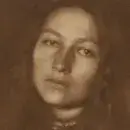
Zitkala-Ša (Red Bird), Gertrude Simmons Bonnin
Zitkala-Ša (Red Bird), Gertrude Simmons Bonnin, was a cofounder of the National Council of American Indians (1926), a librettist, and the author of several books that brought Native American stories to a wide, English-speaking audience.
A member of the Yankton Dakota Sioux, she studied at Earlham College in Indiana and at the New England Conservatory of Music in Boston. She taught music at the Carlisle Indian Industrial School in Pennsylvania, where she began writing about Native American life. Her stories and autobiographical pieces appeared in Atlantic Monthly and Harper’s Monthly, but after publishing a piece in Harper’s in 1901 describing the devastating loss of identity experienced by a student at the Carlisle Indian School, she was fired by the school. She then became a correspondent for the Society of American Indians, the first reform organization administered entirely by Native Americans. In 1913, she collaborated with the composer William F. Hanson, writing the libretto for the opera The Sun Dance, the first by a Native American. In 1916, she became secretary of the Society of American Indians. She served as liaison between the society and the Bureau of Indian Affairs and edited the society’s American Indian Magazine (1918–1919). She coauthored (with Charles H. Fabens and Matthew K. Sniffen) Oklahoma’s Poor Rich Indians, an Orgy of Graft and Exploitation of the Five Civilized Tribes, Legalized Robbery (1924), which exposed the mistreatment of Native Americans in Oklahoma.
In 1926, she founded the National Council of American Indians, and, as its president, advocated citizenship rights, better educational opportunities, improved health care, and cultural recognition and preservation. Her investigation of land swindles perpetrated against Native Americans led to her appointment as an adviser to the U.S. government’s Meriam Commission (1928).